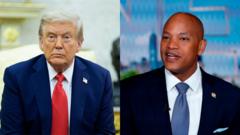The memo’s controversial nature is deeply rooted in the sociopolitical landscape, particularly highlighted by Senegal's glaring gender disparities, exemplified by the disproportionately low representation of women in President Bassirou Diomaye Faye’s administration. The repeal of the ban came a day after its announcement, illustrating the speed at which public sentiment can influence institutional decisions.
Critics have pointed out that Guèye’s political affiliation with the ruling party, known for its anti-colonial rhetoric, influenced his push for regulations that many feel unfairly target personal choices regarding appearance. Prominent feminist commentator Henriette Niang Kandé challenged the ban by questioning the rationale behind restricting aesthetic freedoms and raising issues of economic necessity in opting for wigs and hair extensions.
Although some supporters argue that Guèye's intentions were rooted in fostering pride in African heritage, many see the move as reminiscent of oppression rather than empowerment. Sociologist Mame Diarra Thiam emphasized that defining cultural identity should extend beyond physical appearance and focus more on substantive issues like education and economic equity.
As the director faced mounting scrutiny, he ultimately rescinded the ban, declaring it a misunderstanding and reaffirming his commitment to the theatre's cultural mission. However, the incident has spotlighted larger discontent among urban youth and progressive elements in Senegal who feel alienated and disillusioned by the government’s perceived conservative turn after the elections.
At its core, the wig ban controversy transcends mere aesthetics—it interrogates who determines cultural authenticity in a post-colonial society and the implications of such choices on broader issues such as gender equality and individual liberties. While the immediate restriction on wigs has been lifted, the conversation sparked by this incident is poised to continue, addressing the profound issues of identity and representation in modern Senegal.
Critics have pointed out that Guèye’s political affiliation with the ruling party, known for its anti-colonial rhetoric, influenced his push for regulations that many feel unfairly target personal choices regarding appearance. Prominent feminist commentator Henriette Niang Kandé challenged the ban by questioning the rationale behind restricting aesthetic freedoms and raising issues of economic necessity in opting for wigs and hair extensions.
Although some supporters argue that Guèye's intentions were rooted in fostering pride in African heritage, many see the move as reminiscent of oppression rather than empowerment. Sociologist Mame Diarra Thiam emphasized that defining cultural identity should extend beyond physical appearance and focus more on substantive issues like education and economic equity.
As the director faced mounting scrutiny, he ultimately rescinded the ban, declaring it a misunderstanding and reaffirming his commitment to the theatre's cultural mission. However, the incident has spotlighted larger discontent among urban youth and progressive elements in Senegal who feel alienated and disillusioned by the government’s perceived conservative turn after the elections.
At its core, the wig ban controversy transcends mere aesthetics—it interrogates who determines cultural authenticity in a post-colonial society and the implications of such choices on broader issues such as gender equality and individual liberties. While the immediate restriction on wigs has been lifted, the conversation sparked by this incident is poised to continue, addressing the profound issues of identity and representation in modern Senegal.



















